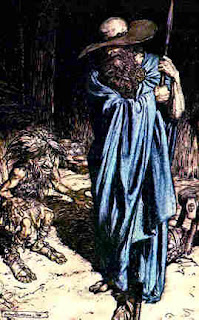'High answered, “There are twelve Æsir whose nature is divine.”
'Just-as-High added: “The goddesses are no less sacred, nor are they less powerful”
'The Third said, “Odin is the highest and oldest of the gods. He rules in all matters and although the other gods are powerful, all serve him as children do their father. Frigg is his wife. She knows the fates of mankind, even though she refuses to pronounce prophecies. So it is said here. Odin spoke with one of the Æsir, Loki.
'“You are raving, Loki,
and out of your mind,
why, Loki, do you not stop?
Frigg knows,
I believe the fate of all,
though she herself says nothing.”
(Loki’s flyting)’
Odin is called All-Father. He is the 'oldest' (though he was sired by Bor?), father of all the gods. He is called Father of the slain. All that fall in battle are his adopted sons. With the fallen he mans
Grim
Gangleri
Herjan, Hjalmberi,
Thekk, Thrid,
Thunn, Unn,
Helblindi, Har
Sann Svipal,
Sanngetal,
Herteit, Hnikar,
Bileyg, Baleyg,
Boverk, Fjolnir,
Grimnir, Glapsvid, Fjolsvid,
Sidhott, Sidskegg,
Sig-Father, Hnikud,
All-Father, Atrid, Farmatyr,
Oski, Omi,
Jafnhar, Blindi,
Gondlir, Harbard,
Svidur, Svidrir,
Jalk, Kjalar, Vidur,
Thror, Ygg, Thund,
Vak, Skilfing,
Vafud, Hroptatyr,
Gaut, Veratyr.
(The lay of Grimnir)
Do you wish to know more? These are the names. There are many.
The names were given as with all the languages of the world each name applies to the different tongues… to whom they might worship, to whom they might pray. Some names are derived from events that took place during Odin’s travels. Through these travels, evolve tales.
His wife Frigg is eventually banished due to an accusation of her infidelities, and yet Odin is certainly not beyond infidelity. His son is Thor whom we find Odin takes pleasure in deceiving and taunting. His blood brother Loki perhaps rebels against the ‘supreme’ fatherhood of Odin. Loki sees himself as Odin’s closest kin, equal of intellect but restrained.
Odin maintains his stance as the All-Father, Father of All, but Odin is not always honest, nor is his judgment always just. Plausibly through this, in the end, comes his ruin.
Odin is the All Father. And yet does he occasionally breach the line between masculinity and femininity? This accusation is submitted in the Lokasenna by Loki who makes his indictment. Odin is accused by Loki of practising Said on Samsey (‘beat on drums as witches do’). Loki can be father and mother and does not seem to feel it necessary to dispute his own masculine or feminine aspects. He, unlike Odin and the other gods, feels no need to deny what and who he is, nor deny his actions. He does, however, seem to crave the respect and acceptance of Odin and the other Æsir and Vanir, though in the climate of his standing with the other ‘gods’, he inevitably fails. Odin’s side is firmly as the ‘General’ with the Vanir and Æsir as necessary allies. Thus in his way Odin betrays his brother. The final result is Loki's 'betrayal' at Ragnarok leading to the end of the gods and the world.
In the ‘Sayings of the High One’ Odin contradicts himself by praising women, then warning the reader and criticising them as deceitful. His reflections are coloured by the advantages/disadvantages that women afford him in a given situation. However, within the ‘Sayings’ are relevant words (even today) from the All-Father and good and useful wisdom. Through his thoughts, one sees Odin’s fallibility, his ‘human’ nature, his insecurities, perhaps. Does this not bring this ‘god’, this All-Father nearer to mankind than many ‘supreme’ beings?






